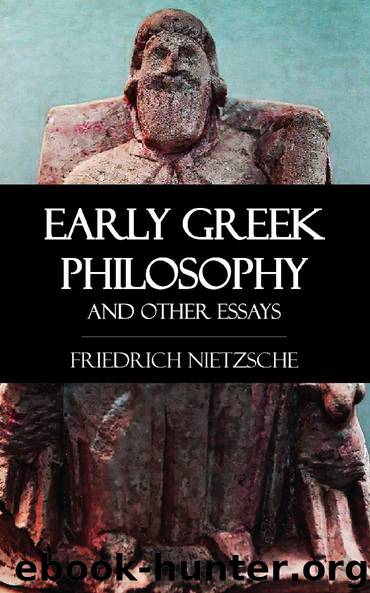Early Greek Philosophy and Other Essays by Friedrich Nietzsche

Author:Friedrich Nietzsche
Language: eng
Format: epub
Publisher: Perennial Press
Who now will still demand from such a philosophy a system of Ethics with the necessary imperative s—Thou Shalt,—or even reproach Heraclitus with such a deficiency. Man down to his last fibre is Necessity and absolutely “unfree “—if by freedom one understands the foolish claim to be able to change at will one’s essentia like a garment, a claim, which up to the present every serious philosophy has rejected with due scorn. That so few human beings live with consciousness in the Logos and in accordance with the all-overlooking artist’s eye originates from their souls being wet and from the fact that men’s eyes and ears, their intellect in general is a bad witness when “moist ooze fills their souls.” Why that is so, is not questioned any more than why fire becomes water and earth. Heraclitus is not compelled to prove (as Leibnitz was) that this world was even the best of all; it was sufficient for him that the world is the beautiful, innocent play of the Æon. Man on the whole is to him even an irrational being, with which the fact that in all his essence the law of all-ruling reason is fulfilled does lot clash. He does not occupy a specially favoured position in nature, whose highest phenomenon is not simple-minded man, but fire, for instance, as stars. In so far as man has through necessity received a share of fire, he is a little more rational; as far as he consists of earth and water it stands badly with his reason. He is not compelled to take cognisance of the Logos simply because he is a human being. Why is there water, why earth? This to Heraclitus is a much more serious problem than to ask, why men are so stupid and bad. In the highest and the most perverted men the same inherent lawfulness and justice manifest themselves. If however one would ask Heraclitus the question “Why is fire not always fire, why is it now water, now earth?” then he would only just answer: “It is a game, don’t take it too pathetically and still less, morally.” Heraclitus describes only the existing world and has the same contemplative pleasure in it which the artist experiences when looking at his growing work. Only those who have cause to be discontented with his natural history of man find him gloomy, melancholy, tearful, sombre, atrabilarious, pessimistic and altogether hateful. He however would take these discontented people, together with their antipathies and sympathies, their hatred und their love, as negligible and perhaps answer them with some such comment as: “Dogs bark at anything they do not know,” or, “To the ass chaff is preferable to gold.”
With such discontented persons also originate the numerous complaints as to the obscurity of the Heraclitean style; probably no man has ever written clearer and more illuminatingly; of course, very abruptly, and therefore naturally obscure to the racing readers. But why a philosopher should intentionally write obscurely—a thing habitually said about
Download
This site does not store any files on its server. We only index and link to content provided by other sites. Please contact the content providers to delete copyright contents if any and email us, we'll remove relevant links or contents immediately.
| Anthropology | Archaeology |
| Philosophy | Politics & Government |
| Social Sciences | Sociology |
| Women's Studies |
The Boy, the Mole, the Fox and the Horse by Charlie Mackesy(3108)
The Traveler's Gift by Andy Andrews(2454)
The Boy, The Mole, The Fox and The Horse by Mackesy Charlie(1697)
Ethics 101 by John C. Maxwell(1538)
The Greatest Miracle in the World by Og Mandino(1355)
The Little Things by Andy Andrews(1328)
Eichmann in Jerusalem by Hannah Arendt(1164)
Twenty-Two by Allison Trowbridge(999)
Integrity: The Courage to Meet the Demands of Reality by Henry Cloud(945)
Dispelling Wetiko by Levy Paul(879)
12 Rules for Life, An Antidote to Chaos by Jordan B. Peterson(862)
Ethics into Action by Peter Singer(854)
Why Courage Matters by John McCain(844)
War is a Force That Gives Us Meaning by Chris Hedges(774)
Ethics, Subjectivity and Truth by Michel Foucault(755)
Ethics: A Very Short Introduction by Simon Blackburn(750)
On the Genealogy of Morality (Hackett Classics) by Friedrich Nietzsche(727)
Eating Animals by Foer Jonathan Safran(717)
A Guide to the Good Life by William B. Irvine(710)
